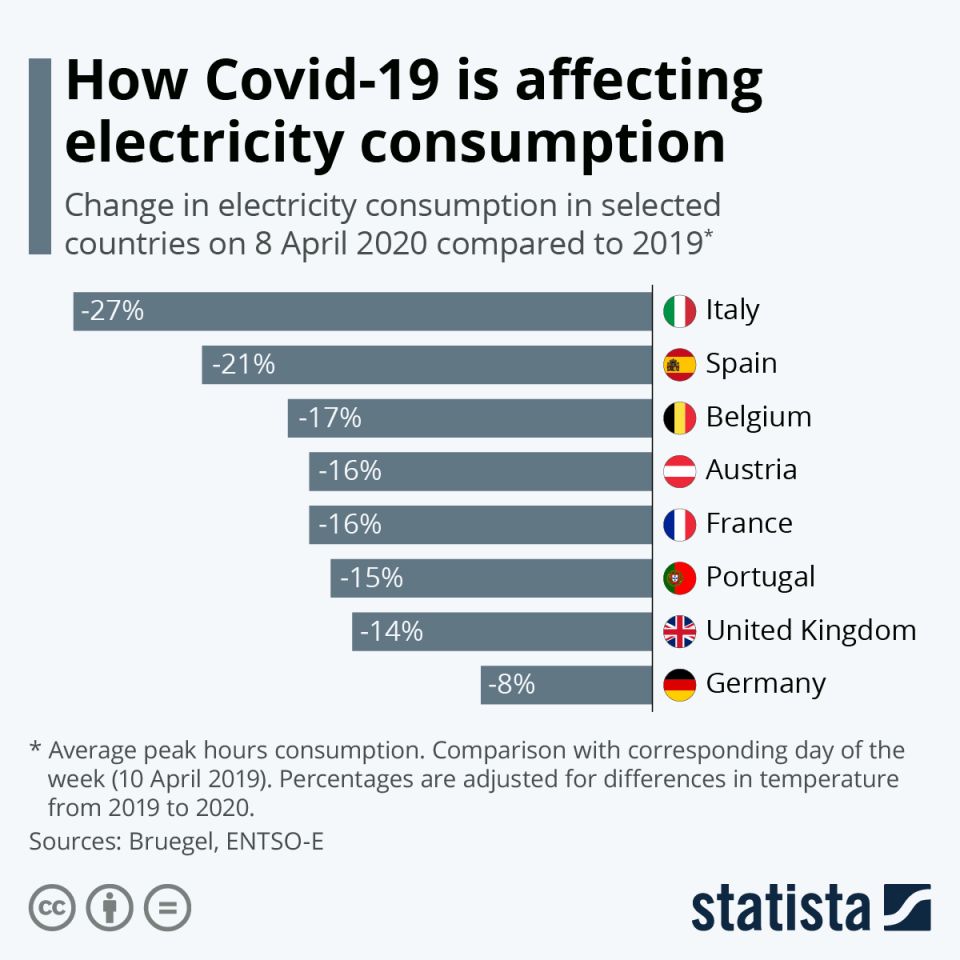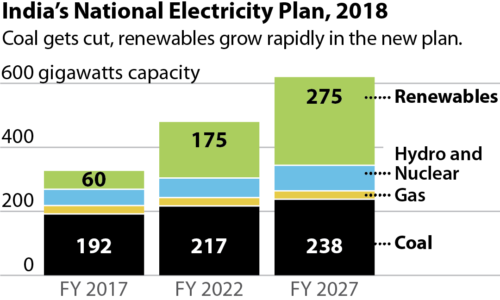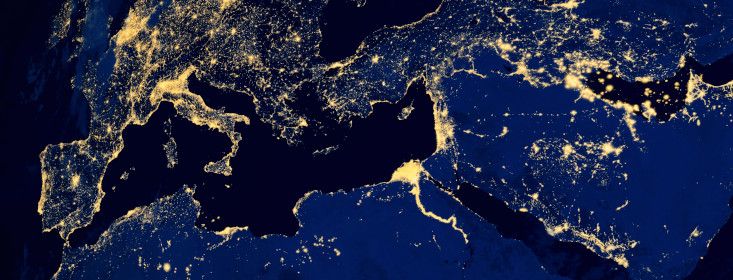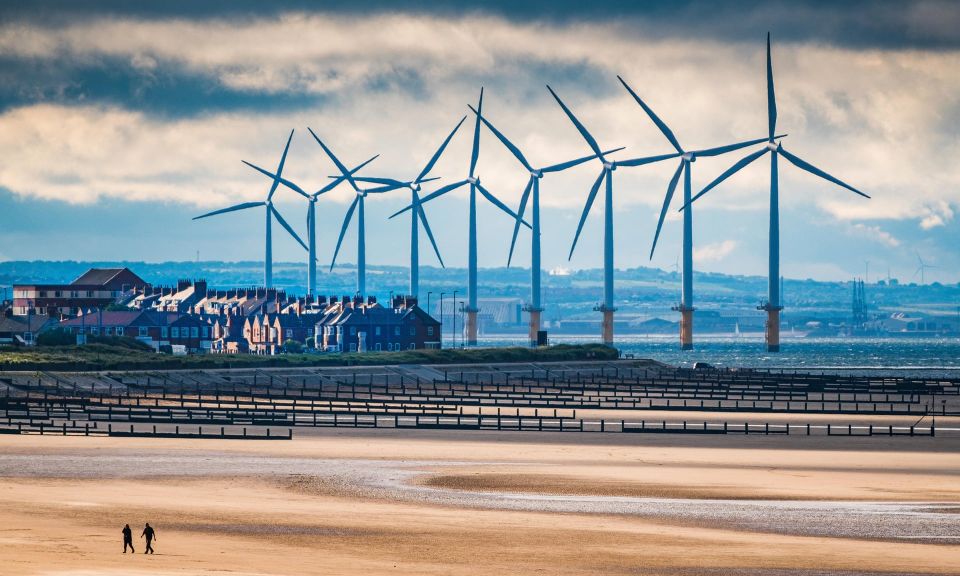Namitha Sunny, "Impact of COVID-19 on Energy sectors and energy consumption globally", Housing Energy Research Network, Platform for Experimental Collaborative Ethnography, (June 11, 2020).
This PECE essay focuses mainly on how the coronavirus pandemic impacted the nery consumption as well as the energy sector globally especially across Europe, Africa and Asia. It is interesting to see how the different countries cope with this issue and even some schemes initiated by the countries.

The above image shows the change in energy consumption in percent values across different countries due to the coronavirus pandemic.

The Coronavirus pandemic has affected the Indian energy sector drastically with some short and long term impacts. Apart from the drop in commercial energy consumption, another interesting event that I would like to point out is the impact of the ‘Nine Minute Lights-Out’ Event announced by the Prime Minister of India to support the essential workers. During this event on April 5th, the electricity grid registered a drop of 32GW, that is nearly 32 percent demand at the time.

India has some ambitious energy transition targets with the social welfare being central to various energy policies. However, with the advent of this global pandemic, these dreams may be delayed from their set targets. India had imposed one of the most stringent lockdown against Covid-19 and this is likely to impact India’s ongoing energy transition. The immediate challenge for India right now is financial liquidity and funding . Analysts expect that the distribution companies will have an annual loss of about $15 billion and as a result cash will be scarce and new investments will become a challenge.
India relied heavily on China that manufactured close to 80% of the solar cells and modules and with the current long haul, restoration will not only cause delays but also increase the component costs significantly.

Ghana’s President Nana Akufo-Addo said in April that the government will fully cover the electricity bills of low-income families for the months of April, May and June to relieve them from all the stress experienced during these periods where lives are being lost and jobs are being taken away at an unbelievable rate. The citizens of the country were delighted with this announcement and the social media were flooding with praises for the Ghanian government.
This article is an interesting read to see how the World Bank and Sustainable Energy for All are working collaboratively with the governments and other partners to help developing and underdeveloped countries during this pandemic. From this read, you can see how energy vulnerable this continent is, and the need for energy literature as well to educate the people more about energy justice and how they should be more vocal about their rights. This also throws light on the policy makers to assess the problems of energy poverty.

This global pandemic has brought out the “new normal” in literally so many dimensions of our daily lives. As the patterns of our lives shift due to this pandemic, so does our energy consumption and demands. Energy consumption in residential areas is seeing a hike whereas commercial buildings, schools and restaurants have little to no demand for energy these days.
In this article, it is interesting to see how they have mentioned a decrease in the amount of stored solar energy sold to the grid. It is surprising to see that in the summer, when the sun shines the longest, the amount of energy sold to the grid is lesser for this year when compared with previous years. This speaks volumes about the shift in energy usage in residential areas due to the lockdown.

This pandemic has really made us all rethink about the way we consume energy.
The coronavirus pandemic may have at least one silver lining and that is the collapse of the oil demand. With the lockdown in place, and the shutdown of factories, schools and business organizations, there is naturally a lesser demand for all forms of energy. The shift for energy demand that exists has also moved from the commercial organizations to residential purposes as you can see with this article that explains the energy shift with the country where this global pandemic originated, China.
The novel coronavirus pandemic which was first reported in China, saw a drop in electricity close to 8% due to the nationwide lockdowns and social distancing rules. The impact in China has been most apparent in the dramatic fall for the demand of oil which has in turn affected the global price of oil. China’s stringent lockdown measures have dropped energy production in every form except solar energy. Xizhou Zhou, vice president for global power and renewables at IHS Markit wrote “Renewable generation volume will unlikely be affected significantly due to their non-dispatchability and preferential status in the Chinese power system.”

The energy sector globally has greatly felt the impact of the coronavirus pandemic and without a doubt this has led to a dampened demand for oil, leading to increase in costs and reduction in production. The Energy Information Administration (EIA) has summarized their concerns about the global liquid fuels, natural gas as well as coal and renewables in their report. However, the EIA is also forecasting a significant recovery in the latter half of the year.
The global energy system is complex and interlinked, and the effects that one sector may have on the other may not be distinctly visible. At the same time some of the few long term positive impacts from the pandemic would be the reduction in global emissions.

This is a really interesting article with a visual representation that helps us observe the week-over-week changes in electricity transmission and demand in the United Kingdom. It analyzes the changes in electricity consumption levels and patterns and also the changes in the energy generation mix.
Weekdays in the UK are looking like weekends with most shops and factories being shut. With many people working from home and schools being shut, people have more time in the mornings as there is no strict adherence to times for commuting to either school or work. This has caused the early morning rush to flatten out and this can be seen as electrical showers, kettles and lights are spread out over a longer period of time. These types of trends are usually seen over the weekends. With the advent of virtual meetings, domestic wifi and data use have seen a steep increase and this has caused an unprecedented strain on data centers across the globe.

Households in the United Kingdom which used the Agile Octopus energy tariff, were contacted to let them know that they would be paid for utilizing the electricity due to the “negative electricity prices.” These negative electricity prices have previously been employed overnight when the need or demand is generally low. However with the coronavirus lockdown and the bright sunny weather, this method has been put into force so that some homes will be able to earn money and at the same time, use clean electricity.
These are the references for the PECE essay.